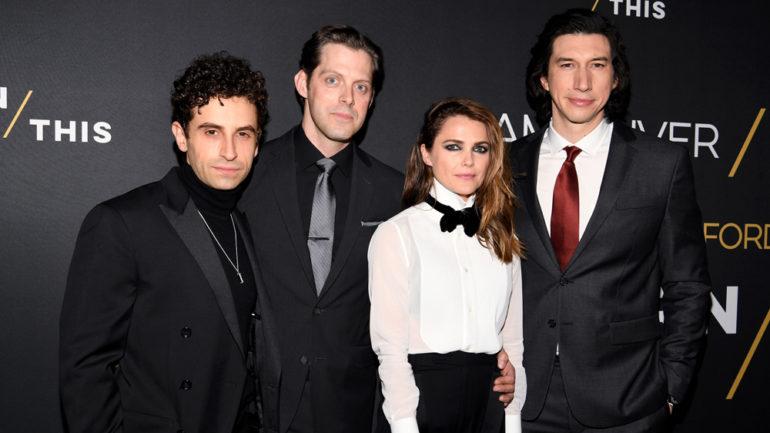‘Burn This’ Director Michael Mayer on Bringing Keri Russell and Adam Driver to Broadway
By Mackenzie Nichols
LOS ANGELES (Variety.com) – When directing the revival of Lanford Wilson’s 1987 play “Burn This,” Michael Mayer gave it a fresh look for the times.
Drawing from his own experience, he transformed the set to reflect 1980s Manhattan living. He also brought in the star power of Adam Driver and Keri Russell to topline the romantic comedy, and made small cuts to modernize the dialogue. The play has earned three Tony nominations and critical acclaim.
“” follows four grief-stricken New Yorkers (Anna, Pale, Burton and Larry) as they grapple with the loss of their friend in a tragic boating accident. Anna (Russell) and Pale (Driver) then spark an unexpected romantic relationship.
Mayer talked to Variety about the changes made to the revival and how he brought 1980s New York to a modern stage.
Why did you decide to direct this revival?
I was invited to direct this about three years ago by a different producer, actually, and I just remember loving the play so much when I first saw it in 1987 and when I read it in 1990. I thought that it was such a funny and poignant piece. To me, the thing that I connected with so much was how it reminded me of what New York was then as a haven for artists and people trying to make their lives and forge the family they choose to be with, as opposed to just the one that they were born into.
What changes did you make?
The only things that we changed were a few cuts because I felt like the cultural references just didn’t really land anymore. I could tell with an audience that they just weren’t great bits. Changes were made out of consideration for contemporary sensibility without violating the truth of the characters or the situation.
What is your connection to Lanford Wilson?
I just felt like when I first came to New York, he represented a combination of the experimental writers that were coming up and poetic naturalism. That was beautiful to see and read those plays that had both the improvisational-sounding monologues you’d hear in plays at La MaMa, and the truthful simplicity of language that was pure theater to me.
Can you describe how you and set designer Derek McLane both brought a sense of the time period into the play?
Both [McLane] and I had spent time in the 1980s in those loft spaces. [McLane] actually lived in one, and I think that [Wilson] puts it so well when he says, “It’s a place that you wouldn’t be caught dead in or that you would kill for.” [The set] suggests a kind of factory, industrial world that has this view of this whole section of Manhattan that at that point was not anything like what the Meatpacking District has become now. It makes very beautiful something that we all lived in and felt like that to us.
These characters are going through quite a bit of grief during this play.
Yeah. That is the other thing I’ll say is that period of New York was also dominated by this enormous sense of loss because everywhere we looked around us, all of these beautiful, talented, young men who were just starting out in their lives were being decimated by AIDS. So you’re just seeing one by one by one, all of these human beings just plucked off the face of the earth. A lot of young people who didn’t live through it can’t imagine what that experience is, but for me, Wilson captures that feeling very, very well, even though the story that he wrote isn’t ostensibly about AIDS.
Conversely to this painstaking loss, there is quite a bit of comedy in it, too.
I remembered the whole thing as kind of a romantic comedy with a lot of bad words in it, but I think we were quite surprised when we had our first audiences, how really hilarious it was. We were not expecting that. And again, when I think back to what that time was, that was precisely how so many of us dealt with the pain and the loss and the fear.
This is ’s Broadway debut, right?
It’s her Broadway debut, it’s amazing. When we did the reading with her of the play she was so lovely in it, and you know, she was on my list of actresses to consider for this part. She had been from the beginning. But, because [Driver] knows her, he’s the one who said, “Why don’t we do a reading with Keri?” And I thought, “Great, let’s do it.” She was so terrific. Brandon [Uranowitz] (Larry) did that reading, too. Weirdly, that one reading ended up being not an audition, but not not an audition.
Did you see yourself in this story?
I definitely feel like I was helpful to [Uranowitz] in terms of really knowing what that very, very specific kind of mid-1980s homosexual New Yorker was. I saw them, I was one, I was friends with them. In working with [Uranowitz], I could be helpful identifying what was the most authentic representation of the character.
Are you excited about all your Tony nominations?
I think the acknowledgements are always wonderful. It’s always good news for your show because it reminds people that it’s really worth seeing. I would’ve nominated all four of [the actors]! It’s an exciting time in New York to have a play on Broadway during this season.

